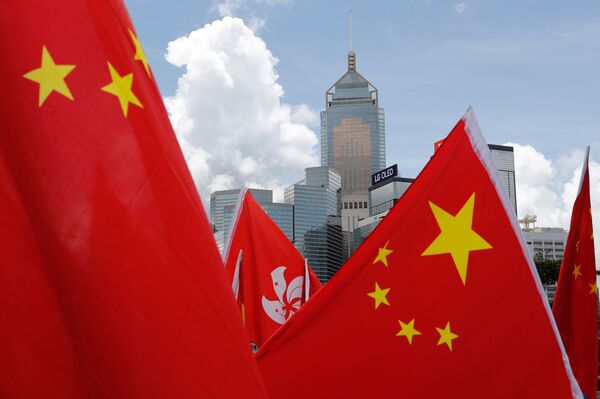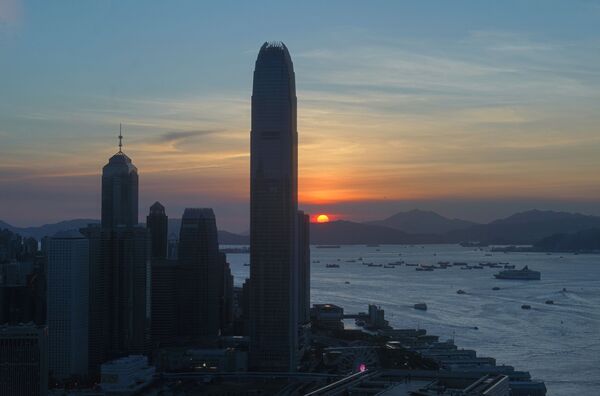Hong Kong’s wealthy residents are reportedly shifting increasing amounts of physical gold out of the financial hub, reports The Financial Times.
Citing dealers in bullion, the outlet writes that private sector investors have transferred some 10 percent of their gold from the city to countries such as Singapore and Switzerland over the past 12 months.
The gold “exodus” first reportedly began last year during anti-government protests that gripped the city and gathered steam after the passing by Beijing of the new security law that left investors jittery over future stability and the “rule of law”.

“Many clients now perceive Hong Kong as riskier than other jurisdictions,” said Joshua Rotbart, head of J Rotbart & Co, a Hong Kong-based gold dealer and storage provider.
According to the expert, once the law was passed there was “immediate response from Hong Kong residents . . . asking to store it [gold] somewhere else”.
While the expert dismissed suggestions that political risk had markedly changed in Hong Kong, he acknowledged that many of his mainland Chinese clients with gold in the financial hub were starting to perceive “Hong Kong as onshore and they want their gold offshore”.
“Investors are moving gold from Hong Kong to Singapore because they don’t like risk and uncertainty,” Ronan Manly, precious metals analyst at Singapore gold storage operator BullionStar was quoted by the outlet as saying.
“This could, in the minds of gold holders, snowball into concerns about safety of bullion and even certainty of property rights,” added Manly.
Hong Kong investors were opting for gold in line with international market movements, not as a “hedge” against concerns over the future of the Hong Kong, claims Peter Fung, head of dealing at Wing Fung Precious Metals, cited by FT.
There are also reports of clients concerned over a spike in crime in the city, with burglaries rising by 47 percent in the first half of 2020 from 786 last year to 1,156 this year.
Others were cited as fearing repercussions from the spiralling US-China trade tensions.
“The concern might be: if I have a dispute with a [Chinese] state-owned enterprise, which way will the legal decision go and how might that affect my assets, [or] what happens if the United States gets more crazy?” a Hong Kong commodity analyst, who did not want to be named, was quoted as saying.
Gold Hits Benchmark
The report comes as on 4 August gold prices hit a benchmark $2,000 an ounce for the first time, amid uncertainty over the COVID-19 pandemic and dismal global financial outlook predictions.
Gold just hit $2000, its highest price in the last 800 years. pic.twitter.com/usXXP4sMd4
— Charles Edwards (@caprioleio) August 4, 2020
The precious metal is increasingly perceived as a refuge, with prices soaring over 30 percent this year amid coronavirus concerns weakening the global economy.
Hong Kong’s unique status, allowing it to enjoy autonomy within the People’s Republic of China under the ‘One Country, Two Systems’ constitutional principal granted to it and Macau after they became Special Administrative Regions in 1997 and 1999, respectively, rendered it a convenient location for international investors and the wealthy residents of mainland China to store gold.

As bullion in China – the world’s largest consumer of gold - is restricted from being exported, Hong Kong was also used to channel gold inflows into the mainland.
Fears Over New Security Law
The recently implemented new national security law has reportedly sparked concerns among investors.
The law, adopted after Hong Kong was rocked by massive protests related to an extradition law that Beijing claimed were caused by foreign interference, penalizes activities considered to be connected with secession, subversion and terrorism, along with foreign collusion that might pose a risk to national security.
Beijing has since been condemned by Western countries for breaching its "one country, two systems" approach to the region.
Dismissing the criticism, China insisted that the law's only goal is to protect national security, adding that the affairs of Hong Kong are exclusively China's and should not be meddled with.


